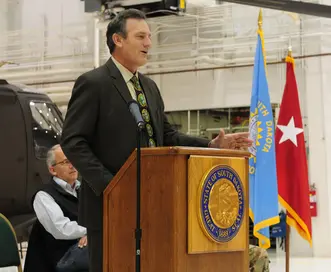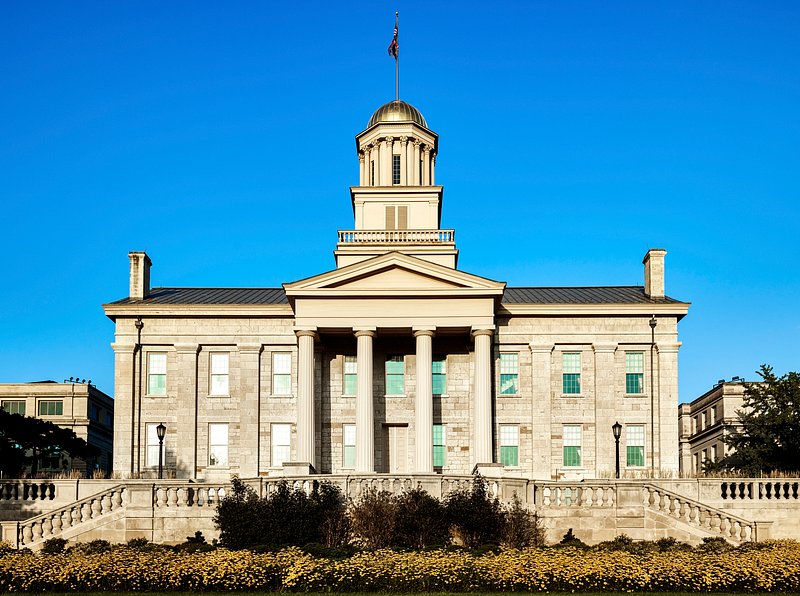Governor Larry Rhoden, the Republican leader of South Dakota, faces the challenging task of filling a vacancy in the South Dakota State House of Representatives. This development comes in the wake of the recent resignation of Republican Representative Chris Reder.
Reder was a key representative for District 1, a sprawling area encompassing the counties of Brown, Day, Marshall, and Roberts. His unexpected resignation, declared via social media, cited “personal and professional reasons” but also followed a swirl of questions regarding his state residency that he chose not to address in his farewell note.
Governor Rhoden is now actively seeking input on suitable candidates to fill this vacancy, a significant decision given the representation needs of the region’s constituents. District 1, representing a wide array of interests from agricultural communities to burgeoning business hubs, is vital in shaping the legislative priorities of South Dakota.

Larry Rhoden
Adding to his plate, Governor Rhoden must also address a second vacancy in South Dakota’s State Senate for District 22. This vacancy arose due to Senator David Wheeler’s appointment as a judge in the state’s Third Circuit, a recognition of his legal acumen and service to the community. The governor’s dual appointments will be scrutinized closely as they will shape the political landscape and policy direction in South Dakota for years to come.
The Impact of Political Vacancies in South Dakota
Political vacancies can have a distinct impact, particularly in a state like South Dakota where each district covers vast geographical areas and represents diverse interests. The role of an elected representative is not just to legislate but to serve as a bridge between the state government and local communities. This relationship is vital in a state where agriculture stands as the backbone of the economy alongside a growing emphasis on biotech and tourism sectors.
The presence of these vacancies signifies a transition period for South Dakota’s legislative framework. With Larry Rhoden at the helm, the state is keenly focused on not only filling these roles but ensuring that those chosen are well-versed in the intricacies of the districts they will serve. The next representatives must continue the discussions around agricultural advancements, infrastructure development, rural healthcare, and technological integration within schools.
Reder’s position, encompassing rural and suburban areas, demands a replacement who understands local cultures and economic interests. This includes the undeniable reliance on agriculture, a sector that contributes significantly to South Dakota’s GDP and supports rural livelihoods.
Voices from the Heartland
Governor Rhoden’s call for input is being met with spirited engagement from the community. Constituents from Brown to Marshall counties are voicing their opinions, emphasizing the need for a representative who will prioritize issues central to South Dakota’s growth and sustainability.
- Advocates for agricultural innovation are hoping for a candidate that prioritizes farm subsidies and modernized farming techniques.
- Indigenous leaders are seeking someone sensitive to the unique tribal concerns within the region.
- Business owners, especially from the tourism industry, advocate for further investment in infrastructure to support economic growth.
- Rural healthcare proponents are pushing for representatives who understand and aim to resolve the challenges within healthcare access and affordability.
The Next Steps Forward
As Governor Rhoden continues to navigate this period of transition, his decisions will likely set precedents for future State House and Senate appointments. The leaders he selects must not only meet immediate legislative needs but also be effective stewards of South Dakota’s long-term vision, balancing traditional economic drivers with emerging industries and technologies.
In the face of these challenges, South Dakota’s unity is found in its collective focus on nurturing its unique identity while progressing into the future. The new appointments in the State House and Senate will play critical roles in this ongoing journey.
For those interested in contributing to this significant decision-making process, outreach to Governor Rhoden’s office remains open. Citizens are encouraged to provide input on candidates who they believe will best serve their interests and uphold South Dakota’s treasured values.
With each vacancy filled, South Dakota reaffirms its dedication to a government that listens, adapts, and responds to the evolving needs of its people, reinforcing a sense of community and continuity within the state legislature.
